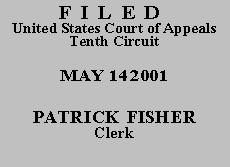

| NORMAN L. PRICER,
Plaintiff-Appellant, v. STATE OF NEW MEXICO, Environmental Department, Defendant, and PETER MAGGIORE, Defendant-Appellee. |
|
Plaintiff Norman L. Pricer appeals from an order of the district court granting summary judgment to defendant in this action brought pursuant to 42 U.S.C. § 1983.(1) We affirm.
Mr. Pricer was employed by the New Mexico Environment Department.(2) Defendant Peter Maggiore, Mr. Pricer's supervisor, decided to transfer Mr. Pricer to the Albuquerque office from the Grants office. Mr. Pricer apparently lives in Grants and did not want to transfer. He contacted his State Senator to have the decision reversed. The Senator interceded on his behalf.
Mr. Pricer thereafter brought this action claiming that Mr. Maggiore had retaliated against him for exercising his First Amendment right to petition his elected state representative. He alleged that Mr. Maggiore delayed his job reclassification, denied him an annual raise, and took other adverse actions, thus violating his constitutional right to petition the government.
The district court determined that Mr. Pricer had not petitioned his Senator on a matter of public concern and therefore, he had not stated a claim. The district court also held that defendant was entitled to qualified immunity.
On appeal, Mr. Pricer asserts he has a constitutional right to contact his congressional representative about a matter of private concern and to have that representative intercede on his behalf. He also contends that Mr. Maggiore is not entitled to qualified immunity.
"We review the district court's grant of summary judgment de novo, applying the same legal standard used by the district court" under Fed. R. Civ. P. 56(c). Simms v. Okla. ex rel. Dep't of Mental Health & Substance Abuse Servs., 165 F.3d 1321, 1326 (10th Cir. 1999). Summary judgment is proper if the moving party shows "there is no genuine issue as to any material fact and that the moving party is entitled to a judgment as a matter of law." Fed. R. Civ. P. 56(c).
The first element that a public employee must establish to determine whether a governmental entity may regulate his or her speech without offending the guarantees of the First Amendment is whether that speech touched upon matters of public concern. Martin v. City of Del City, 179 F.3d 882, 886 (10th Cir. 1999). Mr. Pricer admits that his speech did not involve matters of public concern. See Appellant's App. at 4. However, Mr. Pricer contends the public concern element is not required because his situation does not fall under the constraints of Martin. Mr. Pricer states that he, unlike the plaintiff in Martin, petitioned his state representative who apparently actually intervened on his behalf. The retaliation occurred in response to that intervention.
We agree with the district court that "this distinction lacks significance and that the 'public concern' requirement applies to" Mr. Pricer's claim. District Court's Memorandum Opinion and Order at 3. Mr. Pricer contends that his actions were protected by the Noerr-Pennington doctrine.(3) "[I]t is more appropriate to refer to immunity as Noerr-Pennington immunity only when applied to antitrust claims. In all other contexts, . . . such immunity derives from the right to petition." Cardtoons, L.C. v. Major League Baseball Players Ass'n, 208 F.3d 885, 889-90 (10th Cir.), cert. denied, 121 S. Ct. 175 (2000) (footnote omitted). Mr. Pricer cites to no other authority supporting his proposition, nor have we found any. Mr. Pricer's argument is without merit.
Having determined that the district court properly granted summary judgment against Mr. Pricer on his legal claims, we need not address the issue of whether Mr. Maggiore is entitled to qualified immunity. The judgment of the district court is AFFIRMED.
Entered for the Court
Circuit Judge
*. This order and judgment is not binding precedent, except under the doctrines of law of the case, res judicata, and collateral estoppel. The court generally disfavors the citation of orders and judgments; nevertheless, an order and judgment may be cited under the terms and conditions of 10th Cir. R. 36.3.
1. The district court stated that it was dismissing Mr. Pricer's claims. However, it appears the court was ruling on defendants' motion for summary judgment. Therefore, we review this case under summary judgment standards.
2. The appendix submitted to this court consisted only of the transcript of the pretrial conference. We are thus constrained in our consideration of this appeal and rely on the district court's statement of the facts. See Fed. R. App. P. 10; 10th Cir. R. 10.3.
3. E. R.R. Presidents Conference v. Noerr Motor Freight, Inc., 365 U.S. 127 (1961); United Mine Workers of Am. v. Pennington, 381 U.S. 657 (1965).